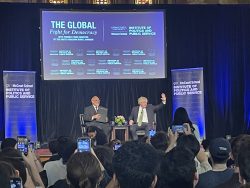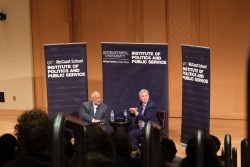Prosecutors ended their seven-month-long investigation into September’s bias-related assault of a Georgetown student after determining they lacked the necessary evidence to prove that their prime suspect, Philip Cooney (MSB ’10), committed the crime.
Last week, the United States Attorney’s Office for the District of Columbia dropped all charges against Cooney, who was accused of committing the assault last fall.
“To support the filing of a criminal charge, the standard of proof is probable cause. To obtain a conviction, though, the standard is much higher, that is, proof beyond a reasonable doubt, which is why with every case we continue to investigate,” Channing Phillips, Principal Assistant U.S. Attorney, wrote in an e-mail.
At 2:30 a.m. on September 9, 2007, an unknown assailant attacked a Georgetown student while shouting anti-gay slurs near the corner of O and 36th Streets, according to the Metropolitan Police Department. The student suffered a broken thumb, bruises and cuts.
The case attracted controversy early on, occurring in the wake of several other anti-gay assaults in the District, and gained national media attention after the victim used Facebook.com to initially identify Cooney, whose father is a former Bush administration official. The victim subsequently identified Cooney a police photo line-up.
“Philip was always completely innocent of the charges against him and the dismissal of the case has vindicated him entirely,” Danny Onorato, Cooney’s lawyer, wrote in an e-mail. Cooney pled “not guilty” at his October arraignment, and Onorato told the Voice last fall his client had passed a lie detector test proving he did not participate in the assault.
Cooney declined a request to comment through his lawyer; the victim did not respond to requests for comment.
While the specifics of the investigation were not released, court documents obtained by the Voice indicate that Cooney’s lawyers intended to challenge the victim’s credibility as a witness.
“[The prosecution] may have some evidence that establishes [Cooney] was probably there and probably did the assault, but they feel that a jury isn’t going to find that it’s beyond a reasonable doubt,” Paul Rothstein, a professor at the Georgetown Law Center, said. “They might keep hoping for some kind of plea bargain that would be reasonable. They may have come to the conclusion that some witnesses may not play very well on the stand.”
Some observers have compared this case to that of several Duke University lacrosse players accused and ultimately cleared of sexual assault charges in 2006. The prosecutor in that case was disbarred.
“The Duke case makes prosecutors and police very wary of going ahead if there’s any doubts, particularly involving college students and more particularly involving well-connected college students who might have the means and wherewithal to fight back,” Rothstein said.
Phillips, the Assistant U.S. Attorney, did note that if new “credible evidence” does come to light, the case could be re-opened.




